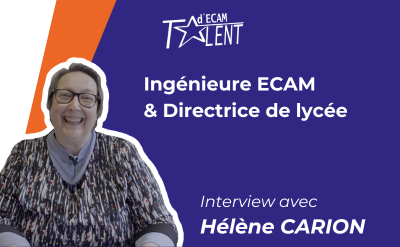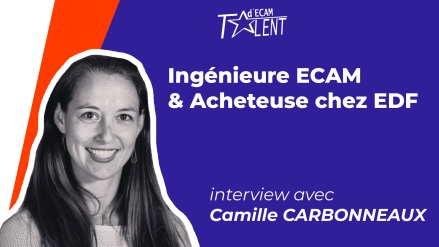News

[PORTRAIT D'ADMINISTRATEUR ECAM ALUMNI] Pierre AYME - ECAM PROMO 1971 AML

SCHOOL
 How did you get to ECAM?
How did you get to ECAM?
I'm a special case: I came to ECAM twice, once as a student (class of 1971) and again as a teacher in 1990.
My entry as a student was a continuation of my attendance at the Lazaristes since 4th grade. The engineering profession suited me. I had a good level in maths and physics, but I didn't want to go into preparatory classes for competitive examinations, so I logically opted for Sup and Spé intégrées. In fact, 1971 was the first class to do 2+3, while those from 1966 to 1970 did 1+4.
The second time was when Bernard PINATEL (class of 1971), then Director of Studies, had to fill the post of teacher in charge of IT at ECAM, and contacted me to see if I knew anyone with experience of IT and teaching! After a few days' reflection, my answer was, as expected: yes, me.
 What stood out for you during your training?
What stood out for you during your training?
50 years on, my memories are more of the atmosphere of fraternity between students and conviviality with certain teachers than of the training itself.
But my return as a teacher at ECAM enabled me to see how the training objectives had evolved in scientific and technical terms.
The aim of the training I received was to turn us into engineers, mainly capable of managing production sites. So, in the spirit of the times, we knew how to "do". Hence the high proportion of practical work in machining, for example.
In 1990, and still today at Arts et Métiers, the aim is to train engineers to design in detail, and to study various systems and/or products. This led to the abolition of practical work on machines, replaced by more scientific courses and analysis-oriented practical work.
In fact, it was after we realized that we no longer had enough engineers to manage production that apprenticeships were created. The many periods spent on the job were a welcome replacement for our long hours on the shop floor!
 What advice would you give to the graduating class?
What advice would you give to the graduating class?
Never forget that, whatever their level or position, your contacts or subordinates are first and foremost people like yourself. So it's your duty to treat them as you would like to be treated.
And keep smiling at all times. At the very least, it will lighten the mood, even at the most difficult times.
WORKING LIFE - PRO CHALLENGES
 TODAY, Pierre AYME, what kind of professional is he?
TODAY, Pierre AYME, what kind of professional is he?
On leaving school, following on from my TFE, I spent 4 years doing research in computer science for numerical control at CECN. At the same time, the first year out of necessity to earn a living, the following years out of a desire to teach, I was a math teacher for students preparing a technical secretarial baccalaureate. Then for 15 years, still teaching in parallel, I worked for an IT services company, specializing in numerical control. Despite this specialization, I produced management software for several companies, including integrated management. In at least one case, it was because I knew how to analyze a plan that I was able to take charge of the company's management!
Needless to say, during those 15 years, the only time I had left to correct many copies was at weekends.
So it was at the beginning of 1990 that, as mentioned above, I said: yes, me! This "yes, me" represented an interesting challenge and, incidentally, had the advantage of freeing up most weekends!
I started out as head of the IT department, which soon became "IT and Production Engineering". One of the first challenges was to replace a mainframe computer with workstations, with all the necessary renewal of computer-related workstations. At the same time, we adopted a new CAD system. Then, a few years later, in parallel with the creation of "micro" rooms, the workstations became large "micro" computers, enabling us to keep pace with developments in CAD.
In 1999, I changed jobs to take charge of the sandwich course launched at ECAM in 1992. The main challenge at the time was to enable the school to take on real pedagogical autonomy in relation to the ITII (Institut des Techniques d'Ingénieur de l'industrie). Just one example: the first step was to take full responsibility for the selection and management of teaching tutors, responsible for following apprentices on the job.
Retired since the end of 2008, until 2020 I was tutor to 4 students per year.
 What does Engineering mean to you?
What does Engineering mean to you?
I think there are as many types of engineer as there are engineers, because each one's personality is important for his or her behavior. But it is possible to give a few indispensable qualities for an engineer, more or less important depending on the position held.
The first three that come to mind are very complementary: knowing how to listen, knowing how to dialogue and knowing how to decide. Listening to all the people affected by a decision, dialoguing with them to find the best possible solution and then, once the final choice has been made, ensuring that the decision is final.
But you also need to keep a critical eye. For example, if a decision you make turns out to be negative, you need to be able to question it.
I won't mention all the scientific expertise.
These are just a few examples, as there are plenty of other qualities needed to make a "good" engineer.
THE NETWORK / YOUR COMMITMENTS TO ECAM ALUMNI
 What does the Network mean to you?
What does the Network mean to you?
For me, the ALUMNI network has several dimensions. The order of importance of those I mention depends on each person's sensibilities:
1 - It keeps you in touch with a wide range of acquaintances. In the first instance, of your own graduating class, but also of other graduating classes, sometimes far away in time, who you may meet during activities organized by the association, or even through business contacts. To achieve this, we need everyone to keep their professional and personal contact details up to date. Just one update and you're in the hands of everyone you know. A real administrative simplification!
2 - it keeps you in touch with other engineers and the school. The website is the main vehicle for this. Here too, updating...
3 - it's a source of opportunity, either through all the offers published on the site, or through direct contact, as was the case for me in 1990, but the site didn't yet exist! Fortunately, I had indicated my change of address and telephone number in the (then) paper directory.
4 - it is a source of reliable data on important points, in particular diplomas. In fact, the association is responsible for updating the IESF national file, which enables anyone to check whether Mr. X has an engineering degree from ECAM.
 Tell me about your role in the association!
Tell me about your role in the association!
From the previous point, you can guess my role: Information Systems and Directory Manager.
It's an essentially technical role, but one that requires constant contact with our service provider and the association's General Secretariat.
When the "paper" directory is published, I'm in charge of all the "lists" generated from the data on the site.
Fortunately, I can delegate all data consistency, especially formatting, to the General Secretariat.
 What motivated this commitment?
What motivated this commitment?
I've always felt involved in the association, but before 1990, my participation in activities was intermittent. Regular since 1990, I've also been secretary of the Lyon group since 2005, and a member of the Board of Directors.
In 2010/2011, my first task was to find the contact details of the 17 or so sandwich course graduates who could be integrated as members of the association thanks to a change in our bylaws.
From 2015 to 2017, I was in charge of generating the files needed by the printer for the entire listing section of the paper directory.
It was when it was necessary to have a new website independent of the school that I accepted responsibility for IS.
Given my track record, I thought I could do it. So I had to do it!
 The final word?
The final word?
You all know the slogan: "Insurance only seems expensive until you have an accident".
Participation in your school's association is just as important. The minimum: keep your contact details up to date.
But just as no one knows who will have an accident, it's impossible to know who will one day need the association.
But do you know what it does and can do for you?

 2
2




























No comment
Log in to post comment. Log in.